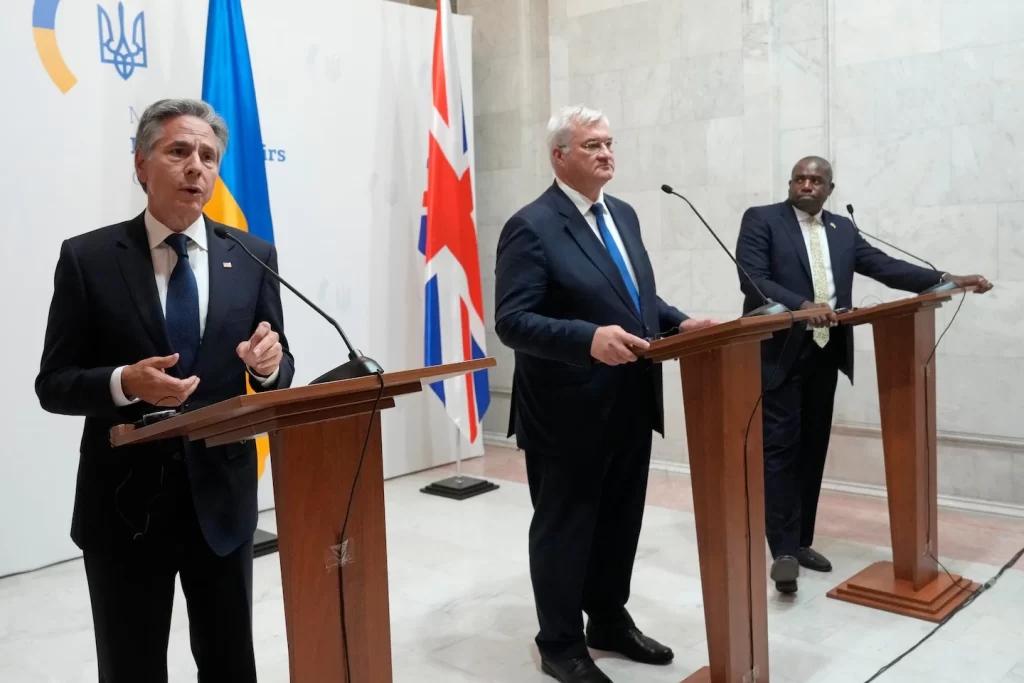
The recent delivery of Iranian ballistic missiles to Russia has intensified the discussion around whether Ukraine should be permitted to use Western-supplied long-range missiles against targets within Russia. This shift in the debate was highlighted by UK Foreign Secretary David Lammy during his visit to Kyiv alongside US Secretary of State Antony Blinken.
Lammy’s visit to the Ukrainian capital followed meetings with Blinken in London, where the two officials conferred with President Volodymyr Zelensky. Zelensky has been vocally advocating for the removal of restrictions on the use of Western long-range weapons, arguing that their current limitations hinder Ukraine’s defensive capabilities.
Currently, the US and UK have imposed restrictions on the use of long-range missiles by Ukraine, primarily out of concern over potential escalation with Russia. This caution stems from fears that such actions could provoke a severe response from Russia, potentially drawing NATO into the conflict or escalating tensions further.
At a joint press conference in Kyiv, Blinken indicated that US President Joe Biden would likely discuss the issue of long-range missile use with UK Prime Minister Sir Keir Starmer during a meeting at the White House on Friday. Addressing concerns about escalation, Blinken noted that Russia’s acquisition of Iranian ballistic missiles represents a significant escalation by Moscow. He suggested that if any party is engaging in escalatory actions, it is Russia, not Ukraine.
Lammy refrained from making a definitive statement on whether the US and UK would lift the restrictions but emphasized the need to avoid giving Russia an advantage. “I am not prepared to give Putin the advantage,” Lammy asserted, reflecting a cautious yet firm stance.
President Biden has indicated that his administration is considering relaxing these restrictions, though no formal decision has been announced. On Wednesday, Zelensky underscored the importance of US support, stating that Ukraine’s success largely depends on continued and robust backing from the United States.
Ukrainian Foreign Minister Andrii Sybiha highlighted the urgency of reassessing the missile restrictions, especially in light of reports suggesting Iran might be supplying ballistic missiles to Russia. Sybiha argued that bold actions are required to counter this new threat.
In an interview with the BBC, Lammy underscored that Iran’s provision of ballistic missiles to Russia represents a significant shift in the strategic landscape. These missiles could enhance Russia’s ability to penetrate deeper into Ukrainian territory, posing a new danger to Ukraine. Lammy called for increased support for Ukraine, emphasizing the need to counterbalance the newly acquired Iranian weaponry.
The UK has committed to providing £600 million ($780 million) in aid to Ukraine, focusing on humanitarian, energy, and stabilization needs. Concurrently, Blinken announced an additional $700 million in US aid, including support for Ukraine’s energy sector and demining efforts. This new aid follows recent sanctions imposed by the US, UK, France, and Germany on Iran for supplying ballistic missiles to Russia. The UK government also summoned Iran’s top diplomat in response to these developments.
Ukrainian Prime Minister Denys Shmyhal expressed gratitude for the UK’s military support but also emphasized the necessity of acquiring long-range weapons to strike Russian military bases. He stressed the importance of receiving further assistance to enhance Ukraine’s defensive and offensive capabilities.
When asked about lifting restrictions on Ukraine’s use of long-range weapons, President Biden noted that the issue is under consideration. Earlier this year, the US had relaxed some restrictions, allowing Ukraine to target Russian positions along the border where troop movements were reported. However, broader use of long-range missiles inside Russia remains limited due to concerns over potential escalation.
The Kremlin has warned of an “appropriate” response if the US were to permit Ukrainian missile strikes on Russian territory. Blinken, during his visit to the UK, accused Iran of supplying short-range ballistic missiles to Russia, which could be used against Ukrainian targets in the near future. Lammy labeled this development as a “significant and dangerous escalation,” highlighting the increased threat to Ukraine.
Iran’s Foreign Minister Abbas Araghchi denied the accusations, dismissing them as based on “faulty intelligence and flawed logic.” Despite this, the possibility of Iranian missiles enhancing Russia’s arsenal remains a grave concern.
Currently, Ukraine is armed with Storm Shadow missiles from the UK, which have a range of approximately 250 kilometers (155 miles). These missiles have been used primarily against Russian targets in occupied Ukrainian territory. Ukrainian leaders argue that having the ability to target air bases used by Russian warplanes, which are often located deep within Russian territory, is crucial for countering the devastating glide bombs launched from these bases.








